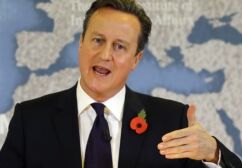正文
EU Immigration Debated at G-20 Meet
Hundreds of thousands of refugees and migrants have arrived in Europe this year.
These men, women and children fled armed conflicts, oppression or poverty at home in search of a better life. The European continent is now facing its biggest migration crisis since World War II. The issue has raised concern and calls for reform in many countries.
Leaders of the world’s largest economies discussed this complex issue at the G-20 summit in Antalya, Turkey. The recent attacks in Paris made security a top concern at the talks.
The leaders promised to increase intelligence sharing and tighten national boarders to cut off financing for extremists. But U.S. President Barack Obama said at the meeting that the United States would not end its plan to accept thousands of Syrian refugees.

British Prime Minister David Cameron announced plans to hold a donor conference early next year. The goal would be to find “significant new funding” to help the refugees leaving Syria.
Last week, the Prime Minister called on the European Union to enact several reforms, including ones to deal with border controls. He made the comments as his country prepares for a referendum on whether or not to leave the 28-nation group.
During a speech in London last week, Cameron discussed the creation of a mechanism to permit countries to jointly block EU legislation. The idea is that countries should have the ability to reject what is not in their national interest.
The British leader said he wants the EU to make a clear and unchangeable agreement that ends his country's obligation to "work for an ever closer union."
The British leader said he supports the free movement of labor among EU members. But, he wants a more fair system and for governments to have more power in controlling immigration.
"As we've seen so spectacularly across Europe, with the questions posed by the migration crisis, countries need greater control to manage the pressures of people coming in," he said.
The prime minister also demanded protections for the one-third of EU nations that do not use the euro currency. He said that if the EU becomes a "single currency club," then Britain would not remain in it.
European Commission spokesman Margaritis Schinas reacted to the comments. He said that some of Cameron's demands are "highly problematic as they touch upon fundamental freedoms of our internal market." He called issues involving the euro "difficult." But, he called finding ways to better involve national parliaments "feasible."
Prime Minister Cameron has said he wants Britain to remain part of the EU. But he has promised to hold a referendum on the issue by the end of 2017. He said if voters choose to leave the EU, then that decision will be final and Britain will not be open to any kind of renegotiation or second referendum.
I’m Mario Ritter.
VOA’s Chris Hannas reported on this story from Washington. Mario Ritter adapted it for Learning English. George Grow was the editor.
相关文章
- Brazilian Painter Brings Attention to Threatened Amazon Rainforest
- Former Diplomat Likely to Become Japan’s Next Prime Minister
- Physics Nobel Prize Rewards Work on Climate Change
- Creators of Molecule Building Tool Win Nobel Prize in Chemistry
- Robots Do It All at Japanese Car Factory
- Solar Panels Help French Winemaker Deal with Climate Change
- S. Korea Launches Group to Debate ‘Living with COVID-19’
- 'The Boy on Graves-End Road,' by Caty Weaver
- In Puerto Rico, Creative Directions Make Up for Missing Addresses
- Rappaccini’s Daughter by Nathaniel Hawthorne, Part Two




 手机网站
手机网站